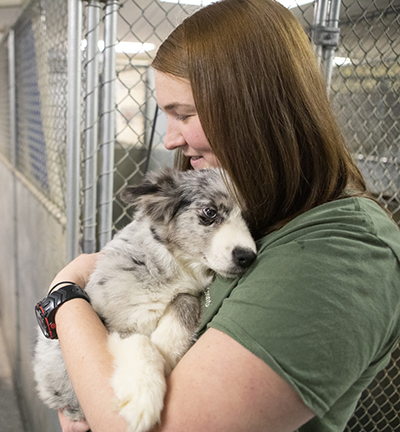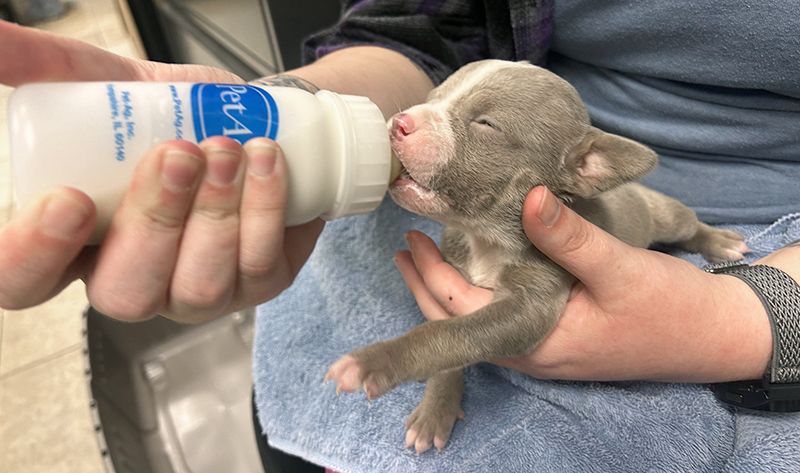Blog: When you’re a target for hate
How relentless criticism and verbal abuse affect shelter workers and animal welfare
March 28, 2024

It’s your sixth shift in a row this week at the shelter, and you’re glad to finally be home after another exhausting 10-hour day trying to juggle all the incoming animals and calls for help. Then it happens: You see a voice message, or notice an email, or check your Facebook comments, and your stomach sinks. It’s a “hater” who knows little to nothing about you, your team or animal sheltering but still has plenty to say about your organization and you personally.
In my pre-shelter life, I was an attorney, and fresh out of law school I spent quite a bit of time feeling my way through cases. But because I had those magic “J.D.” letters behind my name, no one questioned my strategy or advice.

Fast-forward to today: I’ve been in the animal welfare field nearly 25 years. I’ve become a certified animal welfare administrator, led national sheltering initiatives, spoken at national and international conferences, served on several national boards, even authored best practices manuals and research papers—yet to some members of the public, I’m a glorified dog catcher who has no clue what I’m doing.
In just the last three years I’ve been called “Satan” online by a disgruntled employee upset about a euthanasia decision that never happened. I’ve been the subject of a media firestorm waged by several folks attempting to get me fired, almost all of whom have subsequently put in applications to work for me. My most ardent “fan” routinely calls me a murderer, emails and calls my staff to tell them they should leave before they’re arrested alongside me, and files baseless accusations against me with state authorities (which I then have to defend).
I’ve been called out on social media for not answering a stray dog call, and when I responded that my team did answer the call and successfully reunited the dog with the owner, was told, “Well, you still suck.” I’ve received a letter telling me that I should be ashamed of myself for even taking a salary for what I do and that if I had any conscience at all, I would resign.
I’ve been given the moniker “Director Cruella” by the leader of another animal welfare organization because I mistakenly referred to the organization as—gasp—a “rescue group” in a post thanking them for taking on a difficult case (yeah, I don’t get it either).
What do I do about it? I laugh it off. I reassure staff. I email sponsors and ask them to please ignore the person who might call spreading misinformation. I commiserate with my peers. My senior staff jokingly refer to themselves as “Satan’s minions.” But I promise it still hurts.
Sadly, I’m sure many of you can identify. I’ve heard more than one person say, only half joking, “You haven’t really been part of animal welfare until you’ve received your first death threat.” My initiation came nearly 20 years ago when two dogs killed their owner and local advocates threatened to do the same to me if I even considered euthanizing them.
People outside the field are often surprised to learn how intense and relentless the attacks can be on those of us working in animal shelters and rescues. They can’t begin to imagine living through what we accept as just an unfortunate part of the job.
"Nothing hurts more than devoting your life’s work to animals only to be told that you’re incompetent, or worse, you just don’t care. I’m no longer surprised when I hear of another peer leaving the field, or worse yet, leaving us permanently."
When they ask why this happens, the only explanation I can offer is that animal work brings out a lot of passion in many people. When channeled positively, that passion inspires miracles. When channeled negatively, it’s brutal and cuts straight to the heart.
When I started working at the Humane Society of the United States in 2010, my first initiative was a humane discourse pledge, asking animal welfare advocates to commit to treating each other with the same kindness and respect they show the animals. I was thrilled that other national organizations such as the ASPCA, National Federation of Humane Societies and Society of Animal Welfare Administrators (now The Association for Animal Welfare Advancement) signed on, as did hundreds of independent shelters. We went “viral” before that was a thing!
I was genuinely hopeful the tide was turning. But having been back in the trenches as a shelter director for a few years now, I’m sad to say that’s not the case. While many national animal organizations took the pledge to heart and relationships have improved, it hasn’t spread as much among local groups or members of the public. The growth in social media use has made it easier than ever for people to post their gripes online—with little regard to whether their statements are fair, accurate or abusive.

For those on the receiving end, the impact is real. Nothing hurts more than devoting your life’s work to animals only to be told that you’re incompetent, or worse, you just don’t care. I’m no longer surprised when I hear of another peer leaving the field, or worse yet, leaving us permanently. Animal welfare workers are subject to many of the same stresses that cause veterinarians to have one of the highest suicide rates of any profession.
What can we do about it? When it comes to the general public, my team and I take every opportunity to share our work, inviting the media to see us in action, hosting open houses and shelter tours, speaking with community groups and government officials. We explain that sheltering is like an iceberg—the public usually sees just a small portion of our work. They don’t see that to make a shelter run we have to be experts in disease prevention, animal behavior and fear-free handling, for a wide range of species. We run a mini police department, a veterinary clinic, a small business.
We welcome questions from the public about our work and constructive criticism delivered in a respectful manner. Unfortunately, too many of our critics don’t operate that way. Even worse, many attacks come from animal advocates who could be working alongside us to solve problems. We’re all doing the best we can in difficult circumstances, and no perceived slight, difference in operating philosophy, or even unpopular decision or mistake should entitle anyone to villainize or degrade another.
It's hard for people outside the sheltering and rescue field to truly understand the work that we do and the difficult decisions we face every day. But at least those of us working or volunteering in animal welfare should be able to agree that we’re in this battle for the animals together. Infighting only serves to make all our lives more difficult and consumes time and energy that could be spent helping animals.
We must never forget that on the receiving end of that mean tweet or ugly post are real people who genuinely care about making the world better for animals.
So before you’re tempted to lash out or pile on, ask yourself: Would I treat an animal this way? If the answer is no, perhaps there is a more humane, and effective, approach.
Take action: Sign the humane discourse pledge to support compassion and respect in the animal welfare field.
Learn more: Be sure to attend “Humane discourse: A framework for compassionate communication” on Thu., May 16, 2024, at Animal Care Expo. A panel of animal welfare professionals will discuss the importance of respectful dialogue in the animal welfare and veterinary care spaces and share tips for building a compassionate framework for disagreement.

